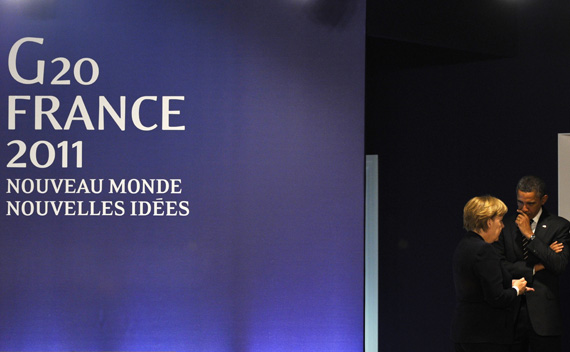The G20 Summit: Some Cause for Optimism Behind the Scenes
More on:

The Group of Twenty (G20) summit was unavoidably preoccupied with stemming the eurozone crisis, and Greece’s surprise decision to hold a referendum on the hard-fought eurozone deal undercut the potential for success on most of the six criteria that I outlined last week. Still, leaders did reach consensus on a few notable, if lower-profile objectives.
At the request of French president Sarkozy, British prime minister David Cameron delivered a presentation on the future of global governance, titled Governance for Growth (PDF). Cameron’s report was a breath of fresh air. “The answer” to global prosperity, the PM declared, “is not to be found in elaborate new institutions and global architecture,” but in the “political will” of G20 nations to reach consensus on objectives, coordinate their economic policies, and provide firm direction to existing international organizations. Disappointing those who want the G20 to become a more formal institution, with a secretariat, Cameron countered—correctly—that the G20’s informality remains its primary strength. The 2011 G20 communiqué (PDF) endorsed this approach, pledging to maintain its status as informal grouping, with a rotating “troika” of past, present, and future presidents to ensure continuity between the G20’s rotating presidency.
Cameron’s paper also recommended that the G20 prioritize immediate action to strengthen the Financial Stability Board (FSB) and the World Trade Organization (WTO). In response, the G20 agreed to reform the FSB, notably by “giving it legal personality and greater financial autonomy.” The FSB is a critical forum for regulators and finance ministries from the world’s twenty leading economies to discuss and coordinate their nations’ domestic approaches to financial regulation. The new agreement will give it much needed resources and institutional heft. On the summit’s closing day, the FSB also unveiled a list of twenty-nine banks around the world (including eight in the United States) deemed to be “systemically important financial institutions” (SIFIs). The G20 communiqué pledged that these major firms would be more strictly monitored and subjected to stricter capital requirements after 2016, to avoid a situation where taxpayers might be left holding the bag if one or more fails. Mario Draghi, new head of the European Central Bank and outgoing chairman of the FSB, touted this reform as “a major milestone” that, if implemented, would “lower the probability and impact of SIFI failure” on the global economy. Still, the five-year time horizon for phasing in these reforms, and the absence of compliance mechanisms, left room for doubt about its ultimate success.
Turning to trade, G20 leaders offered thinner gruel, merely pledging support to strengthen the WTO and enhance its dispute settlement mechanism, without outlining any concrete steps. Still, G20 leaders performed a public service by finally abandoning their “ritual incantation of Doha”. As the communiqué conceded, “It is clear that we will not complete the DDA [Doha Development Agenda] if we continue to conduct negotiations as we have in the past”. The communiqué’s call for finance ministers to meet and discuss challenges and opportunities of global trade was an anemic step (and shouldn’t this be the province of trade ministers?), but it is probably all that could have been expected considering the turmoil in Europe.
The Cannes summit also firmly installed development on the G20 agenda, an achievement which some attribute to Bill Gates’ commissioned paper, Innovation with Impact: Financing 21st Century Development, and the mogul’s ninety-minute session with the world leaders. Embracing this new development role—historically the province of the Group of Eight (G8)—leaders in Cannes announced several development-friendly initiatives. They agreed to take steps to boost global agricultural output and reduce volatility of food commodities, to better feed a world whose population had just hit seven billion. They also agreed not to tax or restrict exports of food purchased for humanitarian purposes by the United Nations World Food Program. In addition, the group set up a task force to “work as a priority on youth unemployment”—a vexing, and politically volatile challenge in many developing countries. At the same time, the G20 rebuffed a longstanding proposal by their French hosts to create a global tax on financial transactions to finance development goals (though a pan-European tax is likely to survive).
Nevertheless, on the big ticket items progress was, as expected, decidedly weak. On the positive side, G20 members moved a bit closer to addressing global imbalances, with even China explicitly agreeing to move toward market-determined exchange rates, and new promises extracted from surplus countries to increase domestic demand. The IMF got the promise of ramped up resources and a greater monitoring role—though G20 members remained resistant to a robust Fund role in their own Mutual Assessment Process (MAP). Indeed, the communiqué’s vague statement that “we [the G20 nations] recognize the need for better integration of bilateral and multilateral surveillance” does not hold much promise.
More fundamentally, as CFR adjunct senior fellow for international economics, Steven Dunaway, observes, the eurozone crisis “is a European problem…For the United States and for the rest of the G20, there’s only a very limited role they can play.” And on the major challenges beyond Europe—like pushing for exchange rate flexibility and macroeconomic balancing, neither of the two major players—China and the United States—are in a position to strike credible compromises. Given China’s pending leadership transition, no Chinese official wants to “stand out and make a strong policy stance, particularly in terms of needed measures to help rebalance China’s economy.” Nor is the United States—which pledged in the communiqué to take timely, near-term measures to stimulate domestic growth—likely to deliver on that aim, given the staunch resistance of the Republican opposition to even a modest Obama stimulus package. Given such divergences both within and among G20 nations, those looking for success at Cannes had to look behind the scenes.
More on:
 Online Store
Online Store
